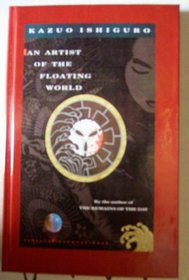Helpful Score: 1
"Good writers abound - good novelists are very rare. Kazuo Ishiguro is... not only a good writer bu also a wonderful novelist." -New York Times Book review.
Winner of the 1986 Whitbread prize and shortlisted for the 1986 Booker prize, this book is about the artist Masuji Ono and is told mainly as he reminiscences about the past. It focuses on how his view of Japan as a dominating imperialist force during WWII now causes grief and difficulty for himself and his family in postwar Japan. The novel is written simply and lyrically, full of understated tension established in each dialogue, and gorgeously descriptive prose. It was even more understated compared to Ishiguro's other works, such as "Remains of the Day," or "Never Let Me Go," which I tended to enjoy a bit more. However, this is still well worth a read as Ishiguro's first novel.
Winner of the 1986 Whitbread prize and shortlisted for the 1986 Booker prize, this book is about the artist Masuji Ono and is told mainly as he reminiscences about the past. It focuses on how his view of Japan as a dominating imperialist force during WWII now causes grief and difficulty for himself and his family in postwar Japan. The novel is written simply and lyrically, full of understated tension established in each dialogue, and gorgeously descriptive prose. It was even more understated compared to Ishiguro's other works, such as "Remains of the Day," or "Never Let Me Go," which I tended to enjoy a bit more. However, this is still well worth a read as Ishiguro's first novel.




